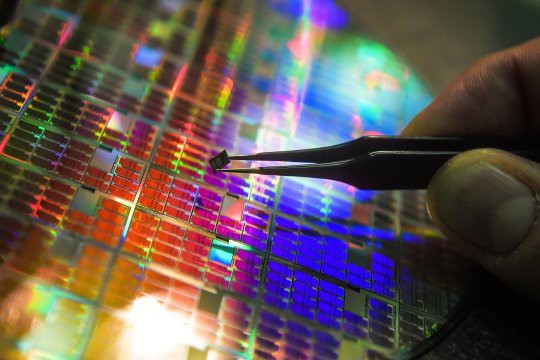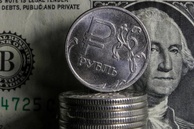The Biden Administration has been expanding sanctions against the electronic industry of China. In turn, Silicon Valley companies are being increasingly viewed as a major instrument of big politics. However, the “geopoliticization” of the IT industry on the part of Washington threatens to further undermine the international positions of the United States in this significant sector of the economy.
China’s progress in IT technologies has been a point of Washington’s concern for years. Unlike before, when they talked mostly about the “threat to the economic positions” of the USA and the West as a whole, now they are signaling concern over “security issues”. A number of new restrictions introduced early in October were designed, as western observers say, to slow down the development of the Chinese IT industry to such an extent that would guarantee the United States supremacy in applying cutting-edge IT technologies for military purposes. Among other measures, Biden has substantially limited the participation of US residents in developing technologies for the Chinese IT sector.
As Bloomberg reported a few days ago, “the United States intends to restrict China’s access to AI and quantum computing technologies”. The White House has been elaborating administrative measures with a view to establish tough limitations and control of western investments in a number of critically important technology-related sectors of China. Quantum computers and AI are among top-priority issues. In case of implementation, the new restrictions will enhance the earlier adopted ones.
It looks like that Biden Administration has been trying to revive the practice introduced by Trump. In 2018 the Trump Administration imposed a wide range of sanctions against China’s IT giant Huawei, which was accused, without any proof, of assisting in “espionage schemes and secret surveillance projects conducted by the Chinese authorities”. They slapped a complete ban on the supplies of American parts which were critical for Huawei products to be competitive on the global market. At present, western sources are signaling content, though not over the cessation of “secret espionage” but over the fact that Huawei’s export revenues have decreased considerably, along with the range of products.
Meanwhile, according to The Economist, Trump’s «success» had a negative side. The Republican Administration overtly ignored the interests of the allies and partners. As a result, western investors began to invest in businesses and supply chains of components that were exempt from the control of the American supervisory bodies. Japanese companies offered a full range of electronic components as produce that was free from technological restrictions imposed by the United States. Some US leading companies, which supplied billions of dollars’ worth of products to the Chinese market annually, started to open branches and representative offices in foreign jurisdictions, thereby bypassing Washington’s restrictions.
By early 2022, having acknowledged a limited range of the existing sanctions, the Biden Administration introduced a new variant of export control, which envisaged tough restrictions on the export to China of components whose characteristics go beyond a certain technological level. At the beginning of October, the ban was expanded to include chips which were produced less than 14 nanometers, or, in some cases, less than 16 nanometers. Such harsh restrictions, along with the unilateral measures taken by Washington, continue to trigger discontent among many nominal allies of the United States.
Biden has also been taking steps to encourage the return of microelectronics production facilities to the United States. In spring, the White House presented a bill on chips and science, The CHIPS and Science Act, which provides for the allocation of at least 52 billion dollars as subsidies for the construction of new “factories” to produce state-of-the-art processors on the territory of the United States. Also in spring, Biden spoke at a ceremony on the site of a future enterprise to be built by Intel – a top processor manufacturer in the US. Plans to build a new “factory” in the US have been voiced by Taiwanese TSMC – a major and the most technologically advanced microprocessor producer in the world.
However, America is facing a lot of “opposition”. According to Foreign Affairs, the CHIPS and Science Act, which came into force at the end of August, is not enough to restore US leading positions in microelectronics. An influx of financial resources will not settle all the problems. What is needed is a breakthrough in the managerial and technological culture and a clear understanding on the part of Washington politicians of all the subtleties and issues the contemporary microelectronics industry is confronted with.
By now, most Silicon Valley companies have lost the spirit of technological “iron” innovations. A wide variety of new “high-tech” companies founded in the USA in the 2000s do not produce products that can be touched with hands. The lion’s share of profit comes from advertising in apps or search systems. The hype over trendy software novelties, which spread across America, enabled the competitors from Asia to break forward in designs, particularly in the production of sophisticated microchips. In addition, globalization in its current shape, aimed at outsourcing the productions of end products to where they are the most cost-effective, has played an evil joke on America. «De-industrilization» covered not only a large number of American industries – it spread on to affect the thinking patterns of their managers and engineers.
At the same time, even American experts admit that the harder they try to “contain” China, the harder it becomes for Washington to persuade its allies in Europe and Asia to follow suit. Active assistance from other countries in restricting the export of indispensable parts, machines and technologies to China is vital, for without it the Unites States risks inflicting irreparable damage to its own electronics sector, in the first place. Investors will surely opt for areas where they can avoid draconian US restrictions and where they can continue to develop mutually profitable business ties with China.
America is “stuck” having to choose between the less tough approach towards restrictions in the exchange of technologies, which can yield a greater effect, on the one hand, and the attempts to “suppress” the advanced Chinese microelectronics over a short period of time, on the other, risking inflicting substantial damage to its own IT potential.
Firstly, many American producers of semi-conductors depend heavily on the supplies to the Chinese market, one of the world’s biggest. As The Financial Times reports, the share of supplies to China makes up one third in the portfolio of orders of Applied Materials, a California-based company, which produces machinery for the processing of silicon wafers. 27 percent belongs to Intel. And 31 percent – to Lam Research, one of the leading suppliers of processor manufacturing equipment.
Secondly, the slowdown of American and global economy may lead to a decrease in sales in the microelectronics sector, which is bound to produce a negative impact on the prospects for new investments. The IT industry is thus facing a slowing down, if not a recession, time. According to The Economist, about 30 major American microchip producers signal an 11-billion-dollar reduction in cumulative revenue prospects for the third quarter since July. The combined capitalization of US-based chip producers has dropped by more than 1.5 trillion dollars this year.
Political pressure has been building up as well, as Washington requires the microelectronics industry to reduce its dependence on China at an early date. Thus, the deteriorating situation on the market is being worsened further by yet more administrative and political restrictions.
Meanwhile, leaders of US companies fear that Beijing may impose measures in response, introducing yet more limitations on the access of American producers to its vast domestic market. As reported by The Financial Times, Europe is concerned that a further expansion of sanction restrictions on the part of the United States will inflict ever more damage to companies and consumers in the Old World. The Chinese producers may find themselves without so-much-needed parts and components. A decrease in supplies will also affect European aerospace enterprises, car manufacturers, producers of medical equipment, and the cloud-based computing sector. The producers of electronic parts from Taiwan, including the key player TSMC, and their counterparts from South Korea, are likely to run into difficulties supplying their businesses in China, which account for dozens of percent of the total output. Japanese companies have been holding heated debates on the middle-and long-term consequences of the restrictions on the use of American components while dealing with Chinese counteragents.
Finally, the severance of scientific ties with China will ruin the innovative potential of American designers. Chinese researchers are already demonstrating a much higher citation index in a whole range of research and technology areas, compared to their American colleagues. According to Beijing Review, during the Trump presidency they launched the so-called “Chinese Initiative” – a set of administrative measures aimed at tracking down potential spies among scientists and engineers of Chinese descent. As the anti-Chinese sentiments gain momentum, throwing America into an atmosphere of hostility and suspicion towards Chinese scientists and experts, thousands of researchers and engineers, including from the microelectronics industry, have left or are planning to leave the USA and move to China, the Asian American Scholar Forum (AASF) said.
Washington’s “efforts” could sadly result in a further decrease of the share of American producers on the global market and an overall drop in the global influence of the US technological sector. All these are happening amid a decrease in demand, caused by an oncoming recession. In the past, the United States repeatedly and successfully forced the destructive dilemma “security or development” on their opponents. Now, America itself risk being trapped by its own hopelessly outdated logic of the past.
The opinion of the author may not coincide with the position of the Editorial
read more in our Telegram-channel https://t.me/The_International_Affairs

 10:14 04.11.2022 •
10:14 04.11.2022 •



























